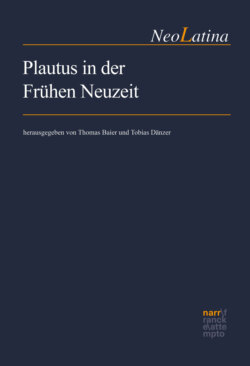Читать книгу Plautus in der Frühen Neuzeit - Группа авторов - Страница 25
5. FabriciusFabricius, Georg’ Letter of 1549
ОглавлениеFabriciusFabricius, Georg’ 1549 letter to CamerariusCamerarius d.Ä., Joachim (Bayerische Staatsbibliothek München, Clm 10431(1, Nr. 183 (fol. 201r))
In the Bavarian State Library in Munich there is a random collection of manuscript letters to CamerariusCamerarius d.Ä., Joachim and others from various scholars.1 Among them is one about editing Plautus from the humanist Georg FabriciusFabricius, Georg of Chemnitz (1516–1571). This is the same FabriciusFabricius, Georg that CamerariusCamerarius d.Ä., Joachim thanks in the 1552 preface (the two corresponded frequently over the years). FabriciusFabricius, Georg sent the letter on October 7, 1549, when he was rector of the Saint Afra school in Meißen (Saxony). The first two thirds are of great interest for the history of Plautine scholarship:
Plautinas aliquot comoedias recentis editionis tuae, cum Aldino et Parisiense exemplo contuli, et cum in lectione veteri, tum in carminum ratione restituenda, magnam diligentiam et planè singulare iudicium animadverti. Vellem totum illud opus nos integrum habere, quod cum videaris quam primum absolvere velle, minime eges hortatore.
Collegi scholasticum libellum ex illius poetae comoediis ad cotidiani sermonis usum, sed illum tam diu apud me retinebo, donec tuo labore frui possim.
Extitit aliquot fabularum exemplum antiquum in Hassensteniana bibliotheca, quo olim Sturnus usus est, eius si nondum vidisti credo tibi potestatem fieri posse. Successus huius operae maxime in bonis exemplaribus positus est, et manuscripta non raro sunt impressis meliora, propter correctorum quorundam imperitiam et temeritatem.
I compared the text of some of Plautus’ comedies in your new edition [sc. of 1549; ch. 7 below] to those in the Aldine and Paris editions. The pains you took and the good judgment you exercised were obvious in both the critical text and in fixing the meter of the polymetric cantica. I wish we had the complete edition! But since you seem eager to finish it off as soon as you can, you certainly don’t need me to cheer you on.
I’ve finished assembling a textbook of extracts from the comedies of Plautus to teach students how to speak everyday Latin, but I’m going to hang on to it until I can have you take a look at it.2
There is an ancient copy of some plays in HassensteinHassenstein, Bohuslaus von’s library; Sturnus used it once. If you haven’t seen it yet, I believe you can get access to it. The success of this effort rests mostly on using good model texts, and manuscripts are often better than printed books, because of the inexperience and thoughtlessness of certain “correctors.”
My heart skipped a beat when I came across this letter; I assumed the third paragraph describes a new, unknown, and ancient manuscript of Plautus, still sitting unexploited on some shelf in “HassensteinHassenstein, Bohuslaus von’s library.” Upon investigation, I have concluded the manuscript described must be one of CamerariusCamerarius d.Ä., Joachim’ two camels, probably the Decurtatus. My case is only circumstantial, but if I’m right, then the mystery of that manuscript’s origin is partially solved. Here is my reasoning.
